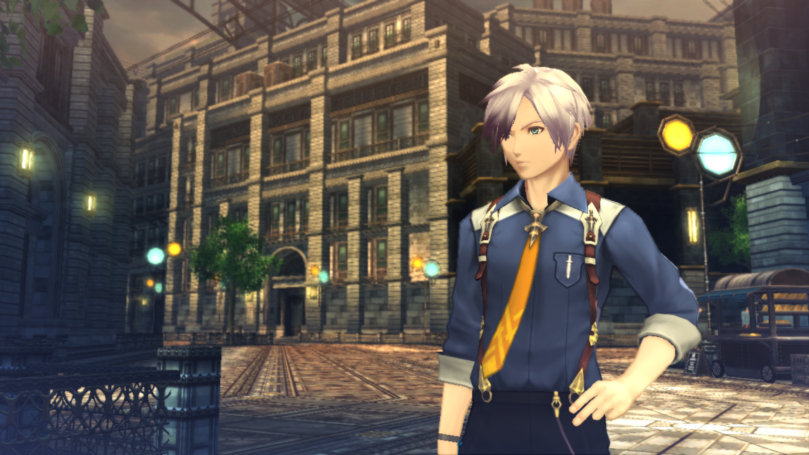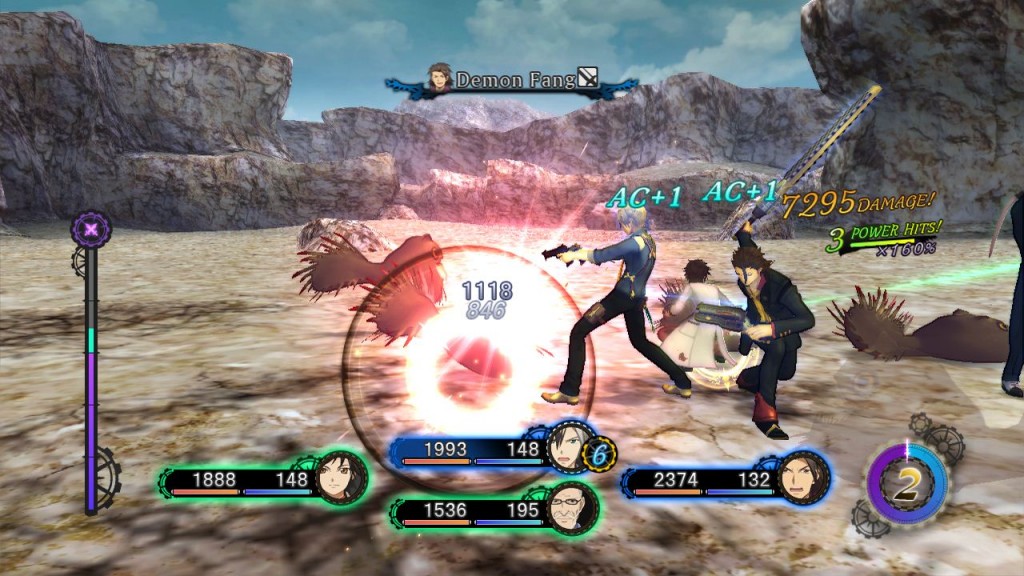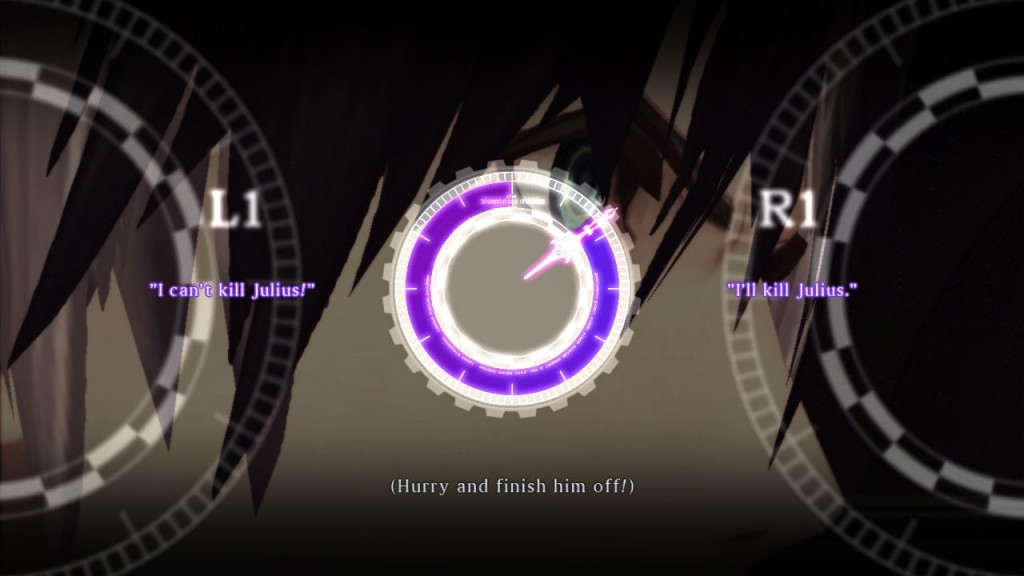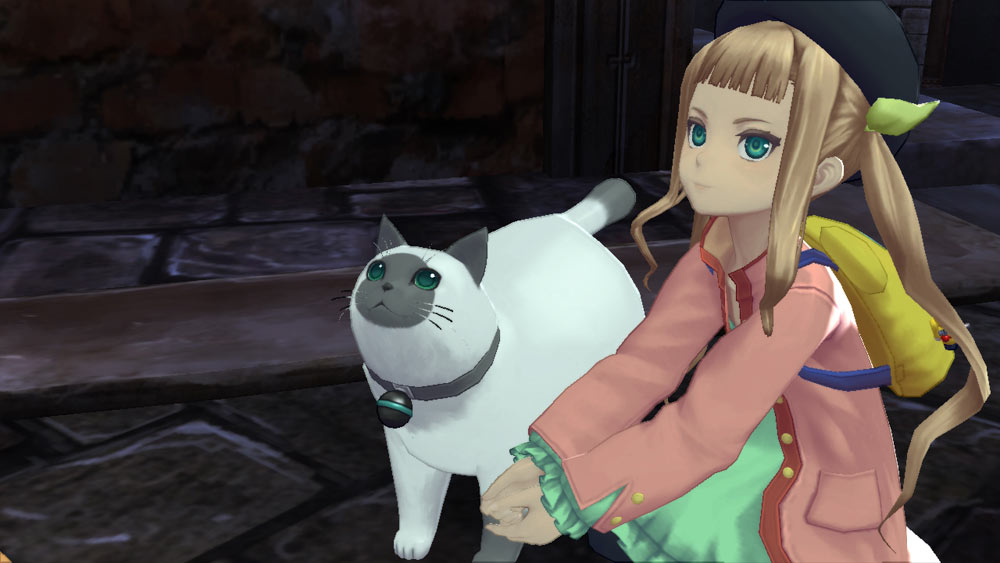
Everyone has one or two of those genres. You know, the ones that you keep going back to year after year, the old stand bys, the ones that you want to play on the rainy days or when you’re sick. We’ve all got ‘em, and JRPGs are one of mine. And just like each one of us has those comfort food genres, each of us has a rather important and long-running franchise that we’ve never really experienced, one that has slipped through the sifter in our panning for “the next great game.”
For me, the Tales series is one of those franchises. I had a general idea of what the franchise was, thanks mostly to a long time friend who put many hours into 2008’s Tales of Vesperia, but I’d never played one myself, mostly because I didn’t have the time to tackle a huge JRPG. For whatever reason, most developers have decided that no JRPG is allowed to have a run time that is below 50 hours, lest it place a pox on their houses. This mindset means that most games are padded out longer than their story or gameplay ideas can support. The worst thing a JRPG can do is waste your time, and unfortunately, Tales of Xillia 2 is a game that does just that.
"In the world of Xillia, people with large amount of debt are treated like criminals, and severe restrictions are placed on their ability to travel, which means you’ll need to make regular debt payments in order to “unlock” new parts of the world and advance the plot.
It starts out fairly promisingly. Protagonist Ludger Kresnik seems content to be living with his brother, Julius and Rollo, their adorable fat cat, and has just landed a new job. Things are going pretty well, until a chance meeting with Jude Mathis from the previous game and a young girl named Elle force Ludger onto a train that’s being hijacked by a terrorist organization known as Exodus. Ludger and company survive the incident but, in what is one of the worst game mechanics I have ever seen in any game, our hero finds himself 20 million gald (yes, you read that right) in debt to the doctor that saves their lives. And I thought my medical bills were ridiculous.
In the world of Xillia, people with large amount of debt are treated like criminals, and severe restrictions are placed on their ability to travel, which means you’ll need to make regular debt payments in order to “unlock” new parts of the world and advance the plot. At first, it’s not that bad. The required payments are pretty small, so you’ll do a few side missions, make the payment and move on. But after a while, the game will prompt you for another, and another, and another. You can shrug most of these off and keep going, but you’ll be forced to pay eventually, when the game won’t let you leave the debt interface.
After a couple hours, the process gets downright painful. It wouldn’t be so bad if the game wasn’t so damn obnoxious about it, but Xillia doesn’t really seem to care about how the mechanic comes across. “We have your wallet surrounded!” Nova, your debt collector, announces as the debt interface forces its way onto your screen. “Give up the gald and no one gets hurt!” So you pay, and the required payments grow larger and larger, and because 20 million is such an enormous number, nothing ever really changes.
"The entire cast of the original game returns to join Ludger, Elle, and Rollo, and each one brings something unique to the party, from Alvin’s scoundrel-like tendencies to Leia’s bumbling perseverance. And then there’s Rollo, who may be the best feline companion in all of video games.
But your ability to do things does. Most of the gear and items in the game can only be acquired by purchasing them from the shops that are scattered among the various cities and other areas, but it becomes hard to justify your purchases with a debt collector breathing down your neck. Let’s see, I could buy some new weapons, armor, and healing items, but then I’d have to grind for another hour to pay back my debt. So you put those purchases off, pay off the debt, and do the best you can against increasingly more difficult enemies with what you have. At least, until your next payment comes due.
“Don’t hate me,” Nova pleads as she walks off with more of your money. “I’m just doing my job.” But it’s kind of hard not to when you can’t buy those boots anymore. Now, I know why the game does this. The story doesn’t really lend itself to a lot of opportunities for combat in the first few hours, so this is an artificial way to force the player to fight and get used to things (and ensure the game hits that 50 hour standard) before the plot really gets moving. That doesn’t change the fact that it’s an awful excuse for forcing the player to grind for hours and then stealing their dough.
It’s a heavy load that the game has to bear, that debt, but Xillia 2 is more than adept at shouldering it. It’s the characters, really. The entire cast of the original game returns to join Ludger, Elle, and Rollo, and each one brings something unique to the party, from Alvin’s scoundrel-like tendencies to Leia’s bumbling perseverance. And then there’s Rollo, who may be the best feline companion in all of video games. Even Nova becomes somewhat endearing when she’s not picking your pocket. Watching these characters grow and interact is a real joy, and the game balances humor with moments of emotional resonance very well. The real stars, of course, are Ludger and Elle, and their relationship is the best part of all.
"The player can choose how Ludger responds to character and other situations, which influences how other characters view you, the actions the party takes, and even the bosses you’ll fight. It doesn’t do too much to the core plot, so you can choose your responses without worrying about how it will reflect the story’s conclusion.
The player can choose how Ludger responds to character and other situations, which influences how other characters view you, the actions the party takes, and even the bosses you’ll fight. It doesn’t do too much to the core plot, so you can choose your responses without worrying about how it will reflect the story’s conclusion. This has the odd, probably unintended result of making Ludger come off as something of a mute, as your choices are made exclusively through text, but it adds a lot to the game, and the character feels distinctly yours as a result. The final decisions, as you’d expect, are something of a doozy, but it’s satisfying and difficult in a way that feels honest given the numerous twists and turns of the plot, which, like the characters, is engaging and fairly unique.
The battle systems fares equally well. After encountering an enemy in the environment, you’re dropped into fairly large combat arenas and given direct control to hack, strike, shoot, and cast your way out of jams. It’s a pretty satisfying system that demands awareness, precision, and smart party management (especially during boss fights), and while it may come across as a little mashy initially, a steady stream of unlocks, including Chromatus, an ability that allows Ludger to transform and get better at the hacking and the slashing, ensure that there’s always something new to learn and that the battles will do their best to keep you on their toes.
The only downside is the leveling system, which is based on something called Allium Orbs. Orbs allow you to turn ore you find into abilities and passive skills, and different orbs offer different skills based on the element they correspond to. It all sounds good in theory, but the problem is that each orb comes pre-packaged with the abilities it’s going to teach the different characters, leaving little for you to do as a player. It’s not a bad system, per se, but its equip and forget nature makes the act of obtaining abilities feel a little disassociated from combat and gaining levels.
"In the end, however, these problems, serious as they are, don’t detract from all of the things Tales of Xillia 2 does right: the characters, the story, the battle system, even the game world, repetition and all. It’s a game with genuine heart, and a lot of cool ideas. And Rollo.
The last problem that Xillia 2 deals with is repetition, which is mainly due to the game’s story. After a certain point, Ludger is tasked with using his Chromatus to enter and destroy “fractured dimensions” – think alternate universes – to protect the integrity of the “prime dimension,” which just so happens to be his. He does this by warping into the alternate reality and destroying the cause of the fracture, known as the “catalyst,” essentially wiping out that timeline and all of its occupants.
It’s a heady idea that the story deals with in fairly interesting ways, but the real issue are the repetition of the environments. Remember that zone you just walked through? Now you get to do it again, but things are different colors this time around, because that’s how alternate dimensions work. In a game already dealing with far too much repetition (thanks, Nova), it gets kind of old.
In the end, however, these problems, serious as they are, don’t detract from all of the things Tales of Xillia 2 does right: the characters, the story, the battle system, even the game world, repetition and all. It’s a game with genuine heart, and a lot of cool ideas. And Rollo. Seriously, how many video game let you dispatch your hilariously overweight kitty cat to different zones to find items for you? Xillia’s got charm, and it knows it. It’s got problems, and it’s probably not the game to start with if you’re new to the franchise, but if you can stand a little repetition, Xillia 2’s got more than enough here to win you over. Now if only Nova would stop badgering me about my bills.
This game was reviewed on the PlayStation 3.
Great characters with great relationships. And Rollo. The entire cast of the original game returns. A cool storyline. Beautiful art style. An interesting world to explore. Rollo is seriously amazing. Fun battle system that marries accessibility and depth. Player decisions and handled well and make Ludger feel like your character. Did I mention how awesome Rollo is?
The debt mechanic is an awful, tedious way to stretch out the plot. Allium Orbs offer very little freedom in building your characters. You’ll be revisiting a lot of the same environments over and over again. Seriously, the debt mechanic is awful.



















